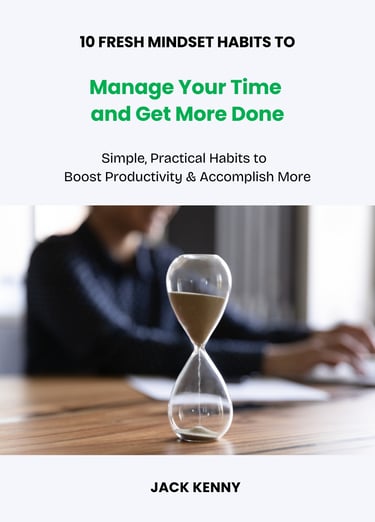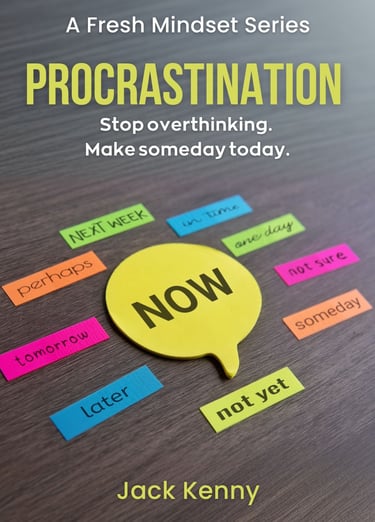10 Fresh Mindset Habits to Manage Your Time and Get More Done
10 min read


Time is one of our most precious resources. We can’t stretch it, rewind it, or wish for more. It isn’t pizza dough! Yet, we cram our days like an overstuffed suitcase, hoping for hidden space. But something always gives, and too often, it’s our mental health.
Managing time isn’t about doing more; it’s about doing things smarter. When we spread ourselves too thin, our quality tanks. It is like watering down a beer, and that just doesn’t work. Instead of trying to do everything, we need to rethink our approach. Tracking where your time actually goes can be eye-opening. There are a lot of improvements we can make. Like money, there’s a lot of waste we don’t notice until we really look. Cut the fluff, and suddenly, there’s more time for what matters.
Prioritizing key tasks and ditching busywork reduces stress, increases focus, and lets you be fully present. Good time management isn’t about squeezing in more work. It is really about creating space for life and the things that are really important. Life balance isn’t just nice. It’s necessary.
1. Start With a Morning Routine
Breakfast is the most important meal of the day, they say.
Now, many people will disagree. Especially the ‘late morning’ people who like to sleep in. Maybe I am biased, but like breakfast, I feel the morning is the most important time of the day. It’s the perfect time to get off to a good start. Have a shit start, and you are playing catch-up the whole day.
Imagine sipping coffee, doing a quick workout, or journaling for just five minutes. It helps you feel calm and centered before life’s chaos hits. A structured morning gives you control, a rare thing before the storm of daily distractions. Instead of rushing around, you've already planned your day. By taking a few minutes to prioritize, you prepare your mind to handle whatever comes your way. You'll have clarity on what matters, and that helps you approach the day with confidence, not stress.
It doesn't need to be complicated. The goal is consistency, finding what works for you, and setting yourself up for a productive day.
Sure, life often throws a spanner in the works, but at least you will be better prepared to deal with whatever hits the fan.
2. Create a To-Do List
Some people love lists and value them more than oxygen. If it’s not on the list, then it doesn’t exist. Other people like to have a rough list in their heads and tick things off if and when they get to them.
I love lists because they help me organize my thoughts and declutter my mind. A to-do list is deceptively simple but incredibly effective. It’s a tool that helps you stay on track, ensuring nothing important is forgotten. You don’t need fancy apps or elaborate systems. All you need is just a piece of paper or a note on your phone. It’s all about getting it out of your head and onto paper.
Of course, lists never end. New tasks pop up as old ones are crossed off, but that’s fine. It helps you prioritize. Break big tasks into smaller, manageable ones to avoid feeling overwhelmed.
Not all tasks are equal, so ranking tasks by importance is crucial. Tackle the urgent ones first, and save the fun ones for later. A realistic list, one that doesn’t set you up for failure, will keep you motivated. Be kind to yourself. Remember, don’t expect perfection; progress is the real goal.
A well-organized list isn’t just about productivity; it clears the mental clutter and helps you stay focused on what matters.
3. Use the Time-Blocking Method
If you don’t make time, you will lose it.
We all have the best intentions to do things that are important to us, but may not be considered important to others. For some, we would love to schedule a workout into our day, but before we know it, the boss is on our tail, the kids need to be dropped off at a sports event on the other side of the earth, or an unexpected emergency has arisen. Sorry workout, you are on the back burner for another day.
Time-blocking is a simple, powerful way to organize your day and boost productivity, while still making time for important tasks like hitting the gym. It involves allocating specific blocks of time to each task, helping you focus on one thing at a time. Most of us try to multitask, but switching between tasks costs us valuable time. Studies show it takes 20 minutes to refocus after switching. Now that is a waste! Time-blocking eliminates this by keeping you focused and preventing tasks from piling up.
The beauty of time-blocking is how it creates urgency, motivating you to get things done within the assigned time. It’s also flexible. You can structure your day based on when you're most productive. For example, mornings for tough tasks, evenings for smaller ones.
It’s not just about scheduling; it’s about protecting your time and mental clarity. With a structured plan, you reduce decision fatigue and distractions. Life’s unpredictable, so leaving buffer time for surprises helps you stay on track. Time-blocking builds consistency, reduces stress, and helps you focus without burning out.
4. Set Boundaries Around Your Time
How much of your time, is actually your time? Does this sound confusing? Let me explain. To be brutally honest, every minute of every day is for you to decide what to do with it. It ultimately is your choice. Now, before you yell out, ‘Hold on – I have kids, work, meetings, and shopping that need to get done’, the black and white version of the truth is you get to decide what you do with your time.
Life's reality is that we’re constantly filling our schedules with work, school runs, and a thousand other tasks. But many of these things don’t need to be done right away, or take as much time as we think. It’s tempting to say “yes” to everything – we want to be helpful, but overcommitting leads to burnout. Burnout isn’t just exhaustion; it drains your joy and makes everything feel like a chore. We spend so much time helping others, we neglect our own needs, fueling frustration and burnout.
The solution? Set boundaries. Saying "no" isn't rude, it’s self-respect. Your time and energy are limited, and protecting them is vital for a balanced life. Communicate your availability, prioritize yourself, and schedule downtime. It’s not selfish, it’s necessary to recharge. Setting limits improves the quality of your commitments. By investing your time wisely, you’ll live a more meaningful, balanced life.
5. Avoid Multitasking
Why take on one task when you can screw it up with two? How often do you start something, then get distracted by an email or text, trying to juggle both at once? Multitasking seems smart, but it’s usually a productivity killer. We tell ourselves we’re being efficient, answering emails in meetings, texting while cooking, or listening to a podcast while working. But, in reality, multitasking slows us down, drains our energy, and makes our work crap.
Our brains aren’t built for complex multitasking. We’re not doing two things at once; we’re constantly switching, losing time and focus each time. Studies show task-switching can reduce productivity by 40%. Multitasking can make even simple tasks exhausting, and you end up mentally drained.
Focus on one task at a time. It’s more efficient and less stressful. When you commit, you get more done and do it better. The key? Single-tasking. You’ll actually finish faster, feel less scattered, and enjoy your work more. Get more done, one task at a time.
6. Learn to Delegate
You are not the only person who knows how to do everything.
Look, you may think you are the best thing since sliced bread in every task on this green earth, but I hate to burst your bubble. There are many people in your immediate surroundings who can do it just as well as you or even better. So why do we feel we need to take everything on instead of spreading the load?
Doesn’t logic tell us that doing less is better? I'm not saying we sit in an empty room all day staring at the ceiling, but if help is available, why not take it? Delegating tasks can be a game-changer, whether at work or in those moments you realize you're the one finding random fucking school shoes 5 minutes before school starts.
When you delegate, you’re freeing up time and energy to focus on what matters. Sure, it feels weird at first, but trying to do it all yourself leads to burnout. Delegation doesn’t mean weakness, it means you’re strategic enough to know your limits. It shows you value your well-being over trying to be a superhero. Plus, delegating builds stronger relationships. You are not a burnt out angry mess all the time. Delegation keeps you sane and productive, so stop being a control freak and give it a try.
7. Eliminate Time Wasters
I hate meetings for the sake of meetings, and any minute I feel is wasted. We all have those time-killing activities, but there are some we don’t mind wasting a bit of time on. But what’s really eating up our time? If we sat down to list where our hours go, we probably wouldn’t like the answer. It's not just work and errands, it's the sneaky stuff, like scrolling through social media, watching “just one more episode,” or agonizing over which is the perfect emoji to send.
To get your time back, you need to see where it’s slipping away, and this involves being honest with yourself. Are you wasting hours on things that don’t move you forward? Start with small changes. Set limits on social media apps, and use a timer to keep you focused. You’d be surprised how much you can get done in 30 minutes when you focus.
Time management isn’t about being productive every second. You need downtime, but it should recharge you, not drain you. Take control of your time now, or one day, you’ll look back and wish you had.
8. Plan Ahead
If you fail to plan, you plan to fail.
I’m sure we have all heard of this wise old saying, but how many of us actually take it to heart? Maybe we feel that ‘winging it’ is the best option, or let’s just see what happens, and I’m sure it will all work out alright in the end. Try telling that to a professional archer. Just fire an arrow into the air, and I’m sure it will hit the target. Maybe not.
Taking a few minutes to plan your day makes a surprisingly big difference. There is no need for a 27-tab detailed spreadsheet. Just 10–15 minutes at the start or end of your day can set you up for success. Instead of waking up, fumbling for coffee, and staring blankly at your to-do list (or realizing you never made one), you already know what’s up. It’s like having a GPS for your tasks so you’re not just wandering around hoping to be productive.
Sure, shit will come up and throw you off course, but at least you’ll be better prepared. Planning keeps stress in check, prevents those "Oh no!" moments, and helps you focus on what actually matters instead of getting sucked into busy work. Life happens, and plans change, but a little structure means you can adapt and keep moving forward.
9. Take Breaks in Your Schedule
We’re not robots. We need breaks.
Working non-stop might feel productive, but it actually turns you into a drained, brain-fogged mess. Ever pushed through a long workday only to feel completely wiped out? Yeah, me too. We’re our own worst enemy when we refuse to take a well-earned break.
Breaks aren’t just for people sipping lattes in fancy cafés. They’re crucial for all of us. And that means you! Your brain is like a phone battery; if you don’t recharge, you crash. And trust me, forcing yourself to focus leads to mistakes when your brain is running on empty.
Short breaks keep you sharp, creative, and sane. A five-minute stretch, snack, or dramatic stare out the window can reset your mind. Hustle culture says grind harder; reality says work smarter. So, take the break. The world won’t collapse because you sat your bum on the couch for 5 minutes.
10. Reflect and Adjust Your Approach
It is important in life to stop and reflect now and again.
A time to pause and see how far you have come, evaluate how it went, learn from it, and plan your next steps forward.
Time management is one of those things that sounds simple but feels like using a hammer—some nail it, others just hit their fucking thumb. There’s no one-size-fits-all approach, so the key is figuring out what actually works for you.
Take a step back. Are you crushing it or constantly drowning in chaos? Spot the patterns. Are you productive at certain times? Wasting time doom-scrolling? If you’re overwhelmed, change something. It just involves small tweaks, not a life overhaul.
Test different strategies—Pomodoro, time blocking, digital calendars, or sticky notes. The goal isn’t to cram your day but to work smarter, not harder. Drop perfectionism. Sorry, troops, but no one is perfect. Done is better than perfect.
So, take a deep breath, step back, and look at how you’re spending your time. Are you focusing on the things that truly matter to you? Are there small tweaks you could make to feel more in control of your day? No need to overhaul everything at once. Just start experimenting with changes and see what helps. And remember that you’re not trying to be a time management master, you’re just trying to create a routine that works for you. No pressure, no guilt—just small, intentional steps toward a more balanced, stress-free life.
By mastering these 10 time management techniques, you’ll not only get more done but also enjoy a greater sense of control and balance in your life. Remember, time is your most valuable resource—use it wisely.
Thanks for your time!
Want to put these habits into action?
We have an exciting book available on Amazon in eBook and paperback format. It is packed with insights and practical steps to help you explore this topic in greater depth.
Plus, with every purchase, you’ll receive a free interactive PDF workbook featuring interactive questions and activities designed to help you apply what you've learned and create real change.
Free Book when you subscribe
Don't forget to subscribe today and receive a free 79-page book:
10 Fresh Mindset Habits to Create New Day’s Resolutions, Instead of New Year’s Goals.
Explore this topic deeper
If you want to explore this topic in greater detail than just habits, we have the perfect book for you. This book is available in both eBook and paperback formats through Amazon.
Again, with every purchase, you’ll receive a free interactive PDF workbook featuring interactive questions and activities designed to help you apply what you've learned and create real change.






